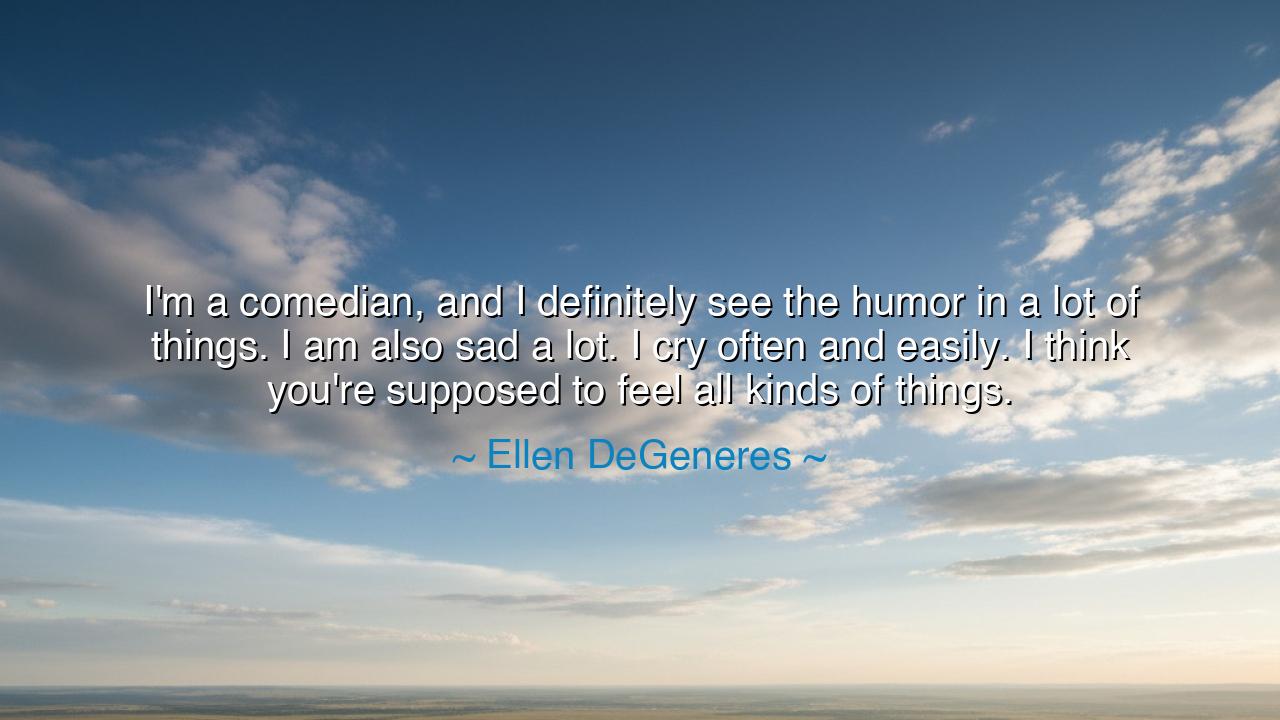
I'm a comedian, and I definitely see the humor in a lot of
I'm a comedian, and I definitely see the humor in a lot of things. I am also sad a lot. I cry often and easily. I think you're supposed to feel all kinds of things.






Hear the words of Ellen DeGeneres, the weaver of laughter and truth: “I’m a comedian, and I definitely see the humor in a lot of things. I am also sad a lot. I cry often and easily. I think you’re supposed to feel all kinds of things.” Though spoken softly, these words carry the strength of a philosopher’s heart, for they speak to the eternal paradox of being human—the mingling of laughter and sorrow, joy and grief, light and shadow. In her confession, DeGeneres unveils a wisdom that the ancients themselves revered: that to live fully is to embrace the whole spectrum of emotion, to let both tears and laughter flow through the soul like twin rivers that nourish the same field.
In this age, many believe that happiness alone is the goal, that sorrow is a thing to be banished or hidden away. Yet the ancients taught otherwise. They knew that the human heart was a vessel vast enough to hold contradictions—that joy and sadness, far from enemies, are companions that give each other meaning. The comedian, in particular, lives at the threshold between these two worlds. For who knows the weight of sorrow better than the one who seeks to relieve it? Ellen DeGeneres, like the jesters of old, reminds us that laughter is not born from ignorance of pain, but from intimacy with it. To laugh at life is to acknowledge its burdens and yet choose light.
Consider the story of Democritus, the philosopher whom the ancients called “the laughing sage.” He wandered through the streets of Greece laughing—not because the world was without suffering, but because he saw its folly and fragility and loved it still. He laughed at kings and beggars alike, for he saw in all of them the same hunger, the same yearning for meaning. Yet in his laughter, there was tenderness. So too in Ellen’s laughter, we find compassion. When she makes the world laugh, she is not denying her tears; she is sharing her courage. For to feel all kinds of things is to be alive in truth, and to express them is to help others remember their own humanity.
There is also the story of Charlie Chaplin, whose silent films made millions laugh through times of despair. Behind his painted smile was a heart heavy with sorrow, yet his gift was not diminished by his sadness—it was deepened by it. Chaplin understood, as DeGeneres does, that comedy is not a rejection of pain but a transmutation of it. The comedian becomes a kind of alchemist, turning grief into gold, transforming the heaviness of existence into something bearable, even beautiful. Such souls do not run from emotion—they become masters of it, shaping it into art that speaks to all.
The origin of DeGeneres’s words lies in this timeless truth: that the complete human experience demands openness. When she says, “I think you’re supposed to feel all kinds of things,” she is echoing the wisdom of poets and mystics—the call to live not half a life, but a full one. The heart that feels only joy becomes shallow, just as the heart that feels only grief becomes hardened. But the heart that allows itself to cry, to laugh, to break, and to heal, becomes vast, strong, and tender all at once. It becomes, as the ancients said, the seat of the divine spark.
This teaching carries a challenge for all who hear it: do not numb yourself. The modern world teaches us to hide emotion behind busyness, to wear smiles as armor, to treat sadness as weakness. But DeGeneres reminds us that to feel deeply—to weep without shame and laugh without restraint—is not weakness but power. It is through emotion that we connect with others, that we cultivate empathy, that we find meaning. The one who can both laugh and cry walks closer to truth than the one who suppresses both. For tears and laughter, though they seem opposite, spring from the same sacred source: love.
Let this be the lesson to carry forward: honor every feeling. When you are joyful, laugh openly, and let your laughter be a blessing to others. When you are sorrowful, weep freely, for your tears water the roots of compassion. Do not divide your heart, but let it be whole. The wise do not seek to silence their emotions—they listen to them. They understand, as Ellen DeGeneres does, that life’s beauty lies in its contrasts. It is the darkness that makes light radiant, and the laughter that gives tears their sweetness.
So, remember this truth, O seeker of balance: to live is to feel. Do not fear your sadness, nor take your laughter for granted. Let both inhabit you fully, and you will know what it means to be alive. For as Ellen DeGeneres reminds us with the courage of her honesty, the purpose of the heart is not to be still—it is to beat, to tremble, to weep, and to rejoice. Feel all kinds of things, for that is where your humanity—and your greatness—reside.






AAdministratorAdministrator
Welcome, honored guests. Please leave a comment, we will respond soon